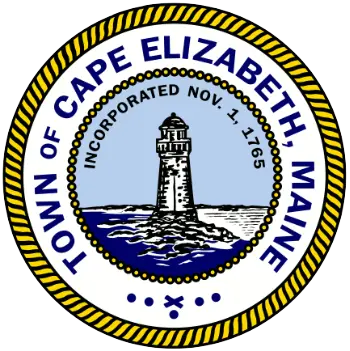Published on May 20, 2020
Cape Elizabeth Schools' Backpack Program has emerged as another silver lining to the cloud cast by the coronavirus pandemic.

Cape Elizabeth Food Service employees and Cape Elizabeth police prepare to deliver food to students learning remotely during the coronavirus pandemic on May 20. From left are, Kelly Withers, Detective Mark Dorval, Darleen Griffin, and Officer Darin Estes. Withers and Griffin are cooks at the Pond Cove/Middle School. (Photo courtesy Robin Taylor)
To date, nearly $6,000 has been donated to help pay for breakfasts and lunches for Cape Elizabeth school students while distance learning is in place. This includes grants from the Full Plates/Full Potential Emergency Fund for School Closures, from the Cape Elizabeth Education Foundation, and from individual donations.
Some Cape families are donating what they would normally have paid for their children to buy a meal at school, said School Business Manager Marcia Weeks. "They've been giving it to the Backpack Program, so I think it's just wonderful," she said at the May 12 meeting of the School Board.
The Backpack Program gets its name from the non-perishable foods provided in backpacks for children to take home over the weekend or school vacation. Since March 18, just after schools closed to stem the spread of the new coronavirus, what would have been served at school is being packaged and delivered by Cape Elizabeth Police, or picked up by families at staggered times at the school.
At the beginning of the coronavirus emergency, the School Board and the food services program made a commitment to continue feeding their students. Operating under federal and state waivers, Cape Elizabeth and other schools in Maine are able to make food available to students while cafeterias are closed.
During the 2019-20 school year, about 6 percent of Cape students (100 students) were eligible for free school meals under USDA subsidized food programs. Some of the Backpack Program food is going to those students, but some is also going to those who are finding themselves in a food-insecure situation. "Our goal is to make sure all students have the necessary food to stay healthy during this stressful time," said Nutrition Director Peter Esposito, who, through various outlets and newsletters, invited families experiencing food insecurity to contact him.
Officer Darin Estes of the Cape Elizabeth Police Department noticed the invitation and, as community liaison officer, offered to help with deliveries. Officers are delivering enough non-perishable food for 4-5 meals per week to 18 families, he said. Another 12 or so families are picking up the food at school.
Cape police have offered to assist others in the community with food insecurity, but Estes said so far the Backpack Program has been the extent of the assistance.
While the Backpack Program meals are eligible for reimbursement under the waiver, loss of full-priced food sales has meant a sharp decline in revenues for food services. Weeks projected a $100,000 shortfall by the end of the fiscal year, with only a small operational savings from not serving in the cafeterias. Salaries and benefits make up 70 percent of the $883,000 food service budgeted for 2019-20, with more than $600,000 of that funded by sales of meals and ala-carte items.
"But I just want you to know that in our surrounding areas, the schools around us are having three times this much of a problem for their deficit," Weeks told members of the School Board. Cape Elizabeth is looking to its contingency fund to offeset the shortfall, as well as other funding sources such as the Federal Emergency Management Agency and the Coronavirus Aid, Relief, and Economic Security (CARES) Act. The schools have also realized savings in transportation and substitute lines since moving to remote learning in March.
But officials are most impressed with the outpouring of support coming from individuals in the community. "It is just lovely to see," said Weeks, lauding also the School Board's commitment to take care of its children.
C-Salt Gourmet Market has also contributed food to the effort, and Pond Cove School teacher David Shields has made contributions from Shields Meats and Produce, said Food Services Assistant Director Robin Taylor.
The federal waiver continues until June 30. However, "If there is still a significant need after school is out we will still continue to make sure we take care of our community," said Nutrition Director Esposito.
The Backpack Program, mirrored after a similar program in Scarborough where Esposito is also director, was introduced in 2017 and was in the process of being implemented before the coronavirus emergency occurred, Esposito said. It was written into the School Department's Student Wellness Policy as a resource for families in June of 2017.
